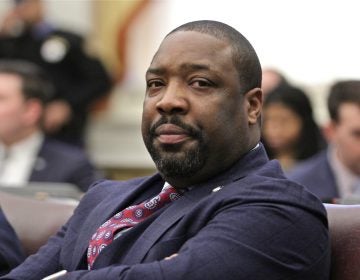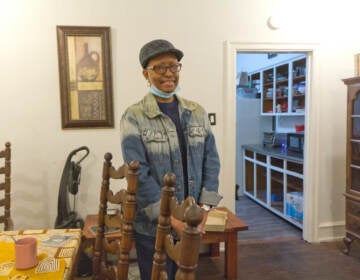Defense team in Johnson bribery trial spars with lead investigator during his fourth day on the stand
An FBI special agent spent a fourth day on the witness stand, defending assertions that fees paid to the Council member’s wife were really bribes in disguise.

Philadelphia City Councilmember Kenyatta Johnson. (AP Photo/Matt Rourke, File)
Email by email, text message by text message, calendar invite by calendar invite, defense attorney Barry Gross built a case designed to disprove allegations that his client was a “low-show” contractor for Universal Companies, the developer and charter school operator at the heart of the federal bribery trial for Philadelphia City Councilmember Kenyatta Johnson.
Prosecutors say Universal hired Dawn Chavous, Johnson’s wife, so they could use her consulting firm to conceal nearly $67,000 in bribe payments to her husband. In return, Johnson allegedly helped the nonprofit maintain control of valuable real estate in his legislative district, including the historic Royal Theater on South Street.
On Wednesday, the fifth day in testimony, Gross spent hours trying to poke a giant hole in those claims. And in particular, an estimate from the case’s lead investigator that Chavous performed less than 40 hours of work during her part-time contract with Universal, which spanned 16 months between 2013 and 2014.
“Your degree is not in organizational dynamics from Penn and you don’t have a certificate from Harvard in charter schools. But then you determined without interviewing a number of people … that this was little work, very little work, less than 40 hours,” Gross told FBI Special Agent Richard Haag during the agent’s fourth day on the witness stand. Haag was the lead federal investigator in the case.
At times, Gross’ efforts were punctuated with prickly exchanges with Haag, whose demeanor with the defense attorney was noticeably combative.
“FBI. That stands for Federal Bureau of Investigation. It’s not FBP — Federal Bureau of Prosecution,” said Gross.
Much of the government’s case against Johnson hinges on the consulting work Chavous did — or did not do — for Universal during his first term representing Council’s second district. If the jury believes Gross’ assertions about his client, the $67,000 Universal paid Chavous was simply her compensation — not bribe money.
According to evidence presented at trial, Chavous was primarily hired to help the nonprofit spread its story to wealthy individuals and well-heeled institutions that financially supported the charter school movement, but not Universal’s network of schools in Philadelphia.
Gross said Chavous did research, attended meetings and work dinners with elected officials and community leaders, as well as tours with charter school “enthusiasts.” She also logged hours planning a 20th anniversary event organized in the name of public relations, he said.
Over and over, Gross questioned Haag’s assertion that Chavous did little work for Universal.
“You can’t tell us how long this tour took. You were not on this tour. And you don’t know how much time Ms. Chavous took to prepare for this meeting. And you don’t know how long it took her to revise this agenda,” said Gross.
Earlier in the day, Johnson’s attorney, Patrick Egan, reviewed credit card and bank statements with Haag.
As part of its case, the government has spent hours reviewing those documents in an apparent effort to show that Johnson and Chavous were in bad financial shape when Universal hired Chavous in May 2013. Prosecutors highlighted nearly two-dozen overdraft protection notices, Chavous’ considerable credit debt, and a $20,000 line of credit the couple obtained from TD Bank in 2015, after Chavous stopped working for Universal.
Egan worked to counter that narrative by showing jurors that Johnson consistently had a significant amount of money in his personal bank accounts, while also staying current with nearly all of his credit card accounts. He said Chavous started making additional mortgage payments before and after her time with Universal.
“From the time of March 2012 through the time of December 2014, there was never a point where the combined amount for his and her account was less than $20,000,” said Egan.
Defense attorneys will continue to cross-examine Haag on Thursday.

Subscribe to PlanPhilly
WHYY is your source for fact-based, in-depth journalism and information. As a nonprofit organization, we rely on financial support from readers like you. Please give today.









